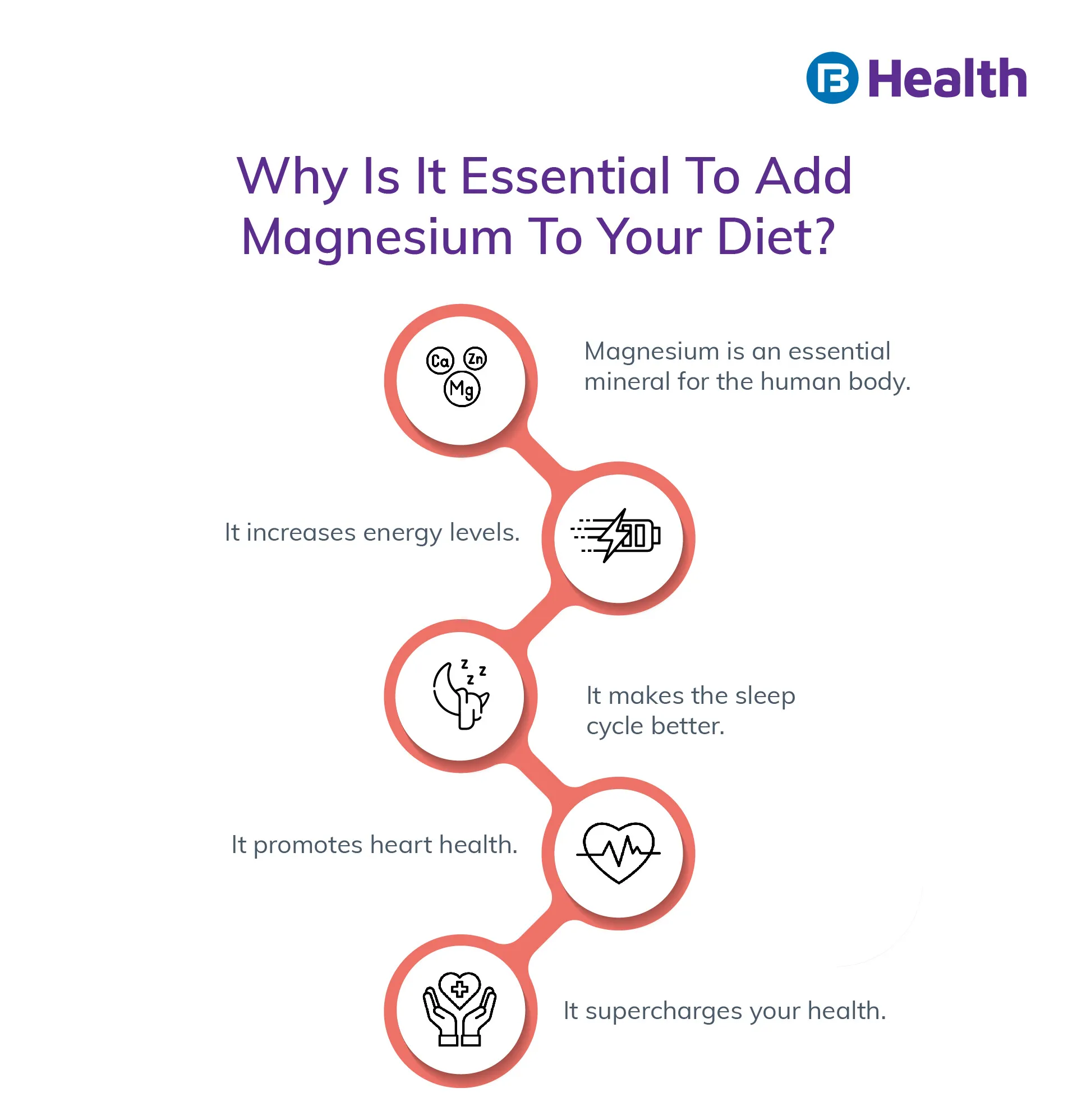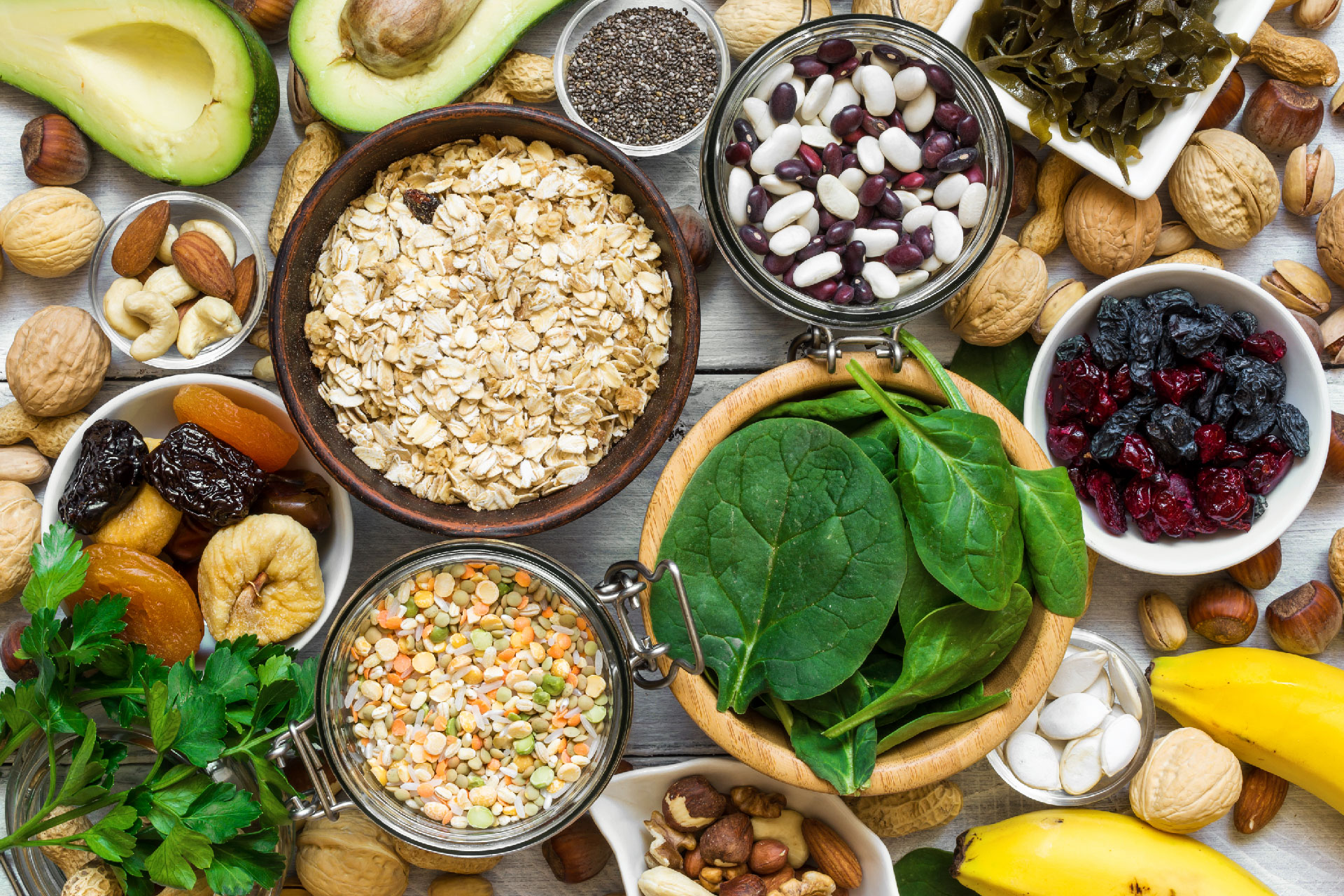Nutrition | 6 min read
Top 10 Magnesium Rich Foods Include in Daily Diet
Medically reviewed by
Table of Content
Synopsis
However, most people consume too few magnesium-containing foods or don’t know where to find them. Here are 10 of the most magnesium rich foods that can supercharge your health without a prescription.
Key Takeaways
- Importance of magnesium foods
- Importance of understanding magnesium deficiency
- Ways to treat magnesium deficiency
Why Are Magnesium-Rich Foods Beneficial?
Magnesium is one of the essential minerals in your body. It supports many vital functions, including heart health and bone strength. Unfortunately, however, magnesium deficiency is quite common. Fortunately, you can quickly correct this deficiency by eating magnesium-rich food. Many different types of food, both plant, and animal-based, are excellent sources of magnesium, so it's easy to include plenty of magnesium rich foods in your diet.
Magnesium plays a role in over 300 biochemical reactions in the body, including building healthy bones and teeth, regulating blood pressure and heart rate, maintaining healthy nerve function and metabolism, controlling sleep cycles (including REM sleep), and helping regulate muscle contractions during digestion or stress responses. It also helps to regulate how much insulin your pancreas releases when you eat carbohydrates or sugars- a critical factor for preventing diabetes.
Magnesium Deficiency
Magnesium deficiency is common due to an improper diet that includes too many processed foods high in sodium (salt), sugar, or corn syrup. Lack of exercise; drinking alcohol excessively; smoking cigarettes; taking diuretics like furosemide (Lasix) which causes increased urination, also leads to loss of magnesium from the body.
Magnesium is an essential nutrient for many bodily functions, including:
Heart Health
Magnesium helps regulate your heartbeat by increasing contractility (the ability to relax muscles) and reducing stress on your heart [1].
Nerve Function
Magnesium supports healthy nerve transmission throughout the body by helping maintain adequate levels of energy production within cells (ATPase). This has been shown to improve cognitive function and general moods such as anxiety or depression.
Bone Strength
A lack of magnesium can cause osteoporosis by weakening bones' calcium absorption capacity, making them unable to retain calcium properly. This results in your bones becoming brittle over time due to insufficient nutrients like vitamin D3. Therefore, use magnesium and calcium-rich food in your diet regularly.
Additional Read: Healthy Calcium-Rich Food
How To Treat Magnesium Deficiency?
Fortunately, you can quickly correct this deficiency by eating magnesium rich foods. However, suppose you don't get enough magnesium by intaking magnesium-rich food or supplements like magnesium oxide or citrate powder (which aren't as absorbable). Then, you may experience fatigue or muscle cramps and even develop long-term health problems like diabetes or osteoporosis.
Foods made from plants and animals both contain magnesium. It's also found in many different types of food, including meats, nuts, and seeds. You can find magnesium rich foods in almost any store you visit.
Magnesium Rich Food
Some of the foods you can take to curb your magnesium deficiency are:
1. Dark Chocolate
Dark chocolate is a nutritious and delicious food rich in magnesium. It can be used as a dessert or snack, but it is an excellent addition to recipes like brownies or cakes. If you're looking for another reason to include dark chocolate in your diet, consider that it's high in antioxidants and an immunity-booster food and can help reduce the risk of certain diseases such as heart problems and cancer.
2. Avocado
Avocados are a great source of magnesium, potassium, and fiber. They also contain healthy fats and Vitamin E, which can help protect your cells from damage caused by free radicals. In addition, avocado is a good source of Vitamin K, C, B6, and folate [2]. Avocados are high in monounsaturated fat, which lowers cholesterol levels; they also contain lutein & zeaxanthin and other antioxidants like Vitamin E that fight against oxidative stress caused by toxins.
3. Spinach
Spinach is a magnesium food packed with the benefits of iron and Vitamin K. It's also a great source of vitamins A, B2, B6, C, and E, as well as folate. Spinach is also an excellent source of folate, which helps prevent congenital disabilities when consumed during pregnancy by women who are planning on having children soon or are already pregnant.
4. Salmon
Salmon is an excellent source of magnesium, an essential mineral for muscle and nerve function. Omega-3 fatty acids, which are crucial for the brain's health, are also abundant. And salmon is rich in Vitamin D, which helps the body absorb calcium from the diet—an essential nutrient for building strong bones. Adding magnesium rich foods like spinach to your diet can bring drastic changes in improving your health and getting rid of magnesium deficiency.

5. Chard
Chard is a leafy green high in minerals, vitamins, and antioxidants. It's also low in calories and fat, so it can help you lose weight. To make chard more appealing to your taste buds (and stomach), add garlic or olive oil to the steamed or sauteed leaves before serving pasta or rice. You can also steam them whole instead of chopping them up for salads—be sure not to overcook them so they retain their vibrant green color.
6. Broccoli
Broccoli is an excellent source of magnesium, and it's also rich in Vitamin C, which helps to absorb magnesium. Broccoli is one of the most antioxidant-rich foods on Earth, providing you with essential nutrients to prevent damage to cells. Broccoli may be low in calories but high in nutrients—and we've found that calories don't matter much when it comes to health benefits like these.
7. Pumpkin Seeds
Pumpkin seeds are a great source of magnesium and zinc and are great protein-rich foods. They're also high in iron, vitamin E, and other nutrients that can help you feel better. Pumpkin seeds contain more than 100 percent of magnesium's recommended daily allowance (RDA). In addition, pumpkin seeds are an excellent source of zinc, which may play a role in helping protect against heart disease and stroke by reducing inflammation in the body.
Additional Read: Protein Rich Food8. Banana
Bananas are a great source of magnesium, potassium, Vitamin B6 and Vitamin C. They also contain fiber which helps you stay fuller for longer. It also provides 3g of magnesium per 100g serving, making it a great food to help you sleep better and improve your energy levels.
9. Yogurt or Kefir
Yogurt and kefir are great ways of adding magnesium-rich food to your diet. They provide plenty of this vital mineral, which is essential for many functions in the body, including maintaining normal blood pressure and heart rate, supporting iron absorption from food sources such as spinach or beans, regulating sleep patterns, preventing cramps during pregnancy, decreasing symptoms of lupus and fibromyalgia by relieving pain caused by inflammation at its source, and much more! Yogurt also provides probiotics that may help prevent disease by improving digestion. Kefir has even more benefits than just being rich in minerals; it can be used as a natural treatment option for conditions like Crohn's Disease or Ulcerative Colitis because it boosts good gut bacteria while reducing bad ones through the fermentation processes that occur naturally during the production of both products.
10. Almonds and Cashews
Almonds and cashews are rich in magnesium, that help in maintaining good health. Almonds and cashews contain a rich source of magnesium, which helps regulate blood pressure, muscle spasms, and muscle cramps. Almonds also contain Vitamin E, which prevents free radical damage.
As you can see, many different foods high in magnesium will provide you with enough magnesium to meet your needs without having to take a supplement. So, whether you're looking to improve your health, lose weight or lower your cholesterol levels, many foods high in magnesium can help. To know about health-related information, you can visit Bajaj Finserv Health and consult professional nutritionists. So, what are you waiting for? Get an online appointment today!
References
- https://www.ncbi.nlm.nih.gov/pmc/articles/PMC6045762/
- https://www.medicalnewstoday.com/articles/270406#:~:text=Avocados%20are%20a%20source%20of,person%20feel%20fuller%20between%20meals.
Disclaimer
Please note that this article is solely meant for informational purposes and Bajaj Finserv Health Limited (“BFHL”) does not shoulder any responsibility of the views/advice/information expressed/given by the writer/reviewer/originator. This article should not be considered as a substitute for any medical advice, diagnosis or treatment. Always consult with your trusted physician/qualified healthcare professional to evaluate your medical condition. The above article has been reviewed by a qualified doctor and BFHL is not responsible for any damages for any information or services provided by any third party.





